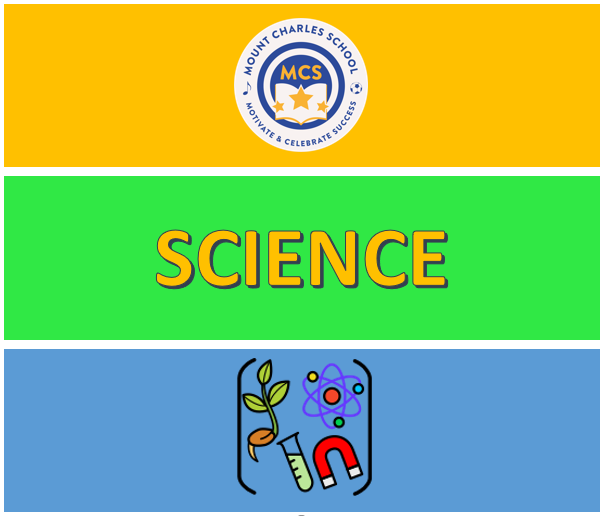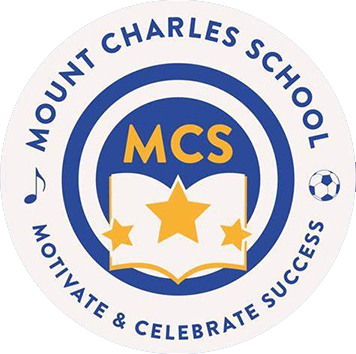
Science

Intent
The national curriculum for science aims to ensure that all pupils:
- develop scientific knowledge and conceptual understanding through the specific disciplines of biology, chemistry and physics.
- develop understanding of the nature, processes and methods of science through different types of science enquiries that help them to answer scientific questions about the world around them.
- are equipped with the scientific knowledge required to understand the uses and implications of science, today and for the future.
At MCS, our use of the PZAZ scheme allows us to fulfil the national curriculum aims as it covers both the knowledge and methods of working scientifically which are required. It is designed to allow the pupils to build their knowledge and skills cumulatively.
At Mount Charles Primary School, we recognise the importance of Science in every aspect of daily life. As one of the core subjects taught in Primary Schools, we give the teaching and learning of Science the prominence it requires and ensure that it is taught weekly.
Where possible, our curriculum has been designed to complement the termly topic but is taught as discrete units and lessons where needed to ensure full coverage. Long-term plans are outlined in curriculum maps and medium-term plans for each year group reference the national curriculum programmes of study and opportunities during which pupils have the opportunity to work scientifically.
The science curriculum we use in our school aims to foster pupils’ ideas and ways of working, enabling children to make sense of the world in which they live through investigation, as well as using and applying processing skills. The staff at Mount Charles ensure that all pupils are exposed to high-quality teaching and learning experiences, which allow them to understand how science can be used to explain what is occurring, predict how things will behave, and analyse causes. The curriculum is designed to ensure that pupils are able to acquire key scientific knowledge through practical experiences; using equipment, conducting experiments, building arguments and explaining concepts confidently. They are immersed in scientific vocabulary which aids pupils’ knowledge and understanding not only of the topic they are studying but of the world around them.
Science teaching at Mount Charles involves adapting and extending the curriculum to match all pupils’ needs. Where necessary, scaffolding and adapted resources are provided for those with additional needs whilst more able pupils are encouraged to further explore links between the taught content and their knowledge and observations of the world around them. All pupils participate in practical experiments with assistance where necessary.
Knowledge is retained by ensuring the progression of curriculum knowledge and skills is sequential and a variety of techniques and approaches are adopted to build on new knowledge and make it stay in pupils’ long-term memory, these include effective use of the learning environment. Pupils’ retention of ‘sticky knowledge’ is assessed with low threat quizzes, games and recall activities at the start of each lesson.
It is our intention that all pupils leave Mount Charles working at the age-related expectation for science before beginning their secondary education.
Implementation
To ensure high standards of teaching and learning in Science at Mount Charles, we implement a Science curriculum that is progressive, building on prior skills and knowledge year on year.
In the EYFS as part of the seven areas of learning, pupils are presented with opportunities to explore their understanding of the world and science is a particular focus of the natural world strand of the early years curriculum. Through half termly topics, pupils explore the natural world around them and make observations and drawings of plants and animals. They discuss the similarities and differences of different environments, seasons and changing states of matter that they experience in books and real life.
In Key Stages 1 and 2, existing knowledge is checked at the beginning of each topic and a knowledge organiser outlining the knowledge required throughout the topic is shared. This ensures that teaching is informed by pupils’ starting points and that it takes account of pupil voice and interests.
Each topic must have elementsmthat challenge the “thinking scientifically” part of the curriculum and focuses on building different aspects of enquiry skills.
During Key Stage 1 pupils observe, explore and ask questions about living things, materials and physical phenomena. They begin to work together to collect evidence to help them answer questions and to link this to simple scientific ideas. They begin to evaluate evidence and use reference materials to find out more about scientific ideas. Pupils share ideas and communicate them using scientific language, drawings, charts and tables.
At Key Stage 2 pupils learn about a wider range of living things, materials and physical phenomena. They make links between ideas and explain things using simple models and theories. They apply their knowledge and understanding of scientific ideas to familiar phenomena, everyday things and personal health. Pupils think about the effects of scientific and technological developments on the environment and in other contexts. They carry out more systematic investigations, working on their own and with others. They use a range of reference sources in their work. Pupils talk about their work and its significance, using a wide range of scientific language, conventional diagrams, charts and graphs.
The national curriculum for science sets out what it means ‘to get better’ at science. Expertise in science requires pupils to build at least two forms, or categories, of knowledge. The first is ‘substantive’ knowledge, which is knowledge of the products of science, such as models, laws and theories. The second category is ‘disciplinary knowledge’, which is knowledge of the practices of science. This teaches pupils how scientific knowledge becomes established and gets revised. Importantly, this involves pupils learning about the many different types of scientific enquiry. It should not be reduced to learning a single scientific method. In the Mount Charles science curriculum, knowledge is carefully sequenced to reveal the interplay between substantive and disciplinary knowledge. This ensures that pupils not only know ‘the science’; they also know the evidence for it and can use this knowledge to work scientifically. These two distinct areas of the science curriculum (‘scientific knowledge and conceptual understanding’ and ‘the nature, processes and methods of science’) are explicit in the progression map for the science curriculum taught at Mount Charles and they are carefully crafted together by teachers to ensure that there is cohesion between the substantive knowledge and disciplinary knowledge.
Impact
In 2024, 84% of Year 6 children met the expected standard in science.
Subject Leader monitoring has shown:
- Pupils are engaged in a wide range of quality, practical scientific activities and experiments.
- Pupils are learning how scientists work in the real world as they are involved in experiments that require observations over several weeks in some year groups.
- Pupils are assisted in recording data by the provision of clear data capture charts.
- Evidence of cross curricular links especially with maths in the recording of data and presentation of results in graphs.
- Teachers plan lessons that meet the needs of all learners.
- Pupils talk with passion about science.
- Teachers are secure in their subject knowledge.
Impact of Science at Mount Charles School is carefully tracked and measured by…
- Monitoring of pupils’ work in books.
- Learning walks to monitor quality of teaching and learning in science.
- Discussion with pupils to ascertain engagement in science.
- Monitoring of short-term planning to ensure all areas of the national curriculum are covered.
- Triangulation of learning walks, book looks, planning and pupil and staff discussion to obtain a reliable overall picture of the quality of teaching and learning in science.
- Assessment tracking on the whole school online assessment tracker, Insight.
An active approach to science at Mount Charles School results in a fun, engaging, high-quality science education, that provides pupils with the foundations for understanding the world. Our engagement with the local environment ensures that pupils learn through varied and first-hand experiences of the world around them.
The impact and measure of this ensures pupils not only acquire the appropriate age-related knowledge linked to the science curriculum, but also skills which equip them to progress from their starting points, and within their everyday lives.
Pupils leave Mount Charles School having gained a wide variety of skills linked to both scientific knowledge and understanding and scientific enquiry/investigative skills. Furthermore, pupils acquire a rich scientific vocabulary enabling them to articulate an understanding of taught concepts which will see them through to further study, work and a successful adult life.
